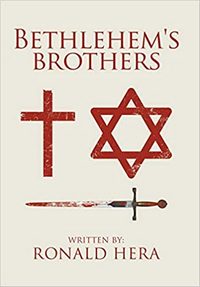
This historical fiction starts off with a bang—in a small home during the Massacre of the Innocents. One father (probably others, but we’re focused on one family here) tries to prevent the soldier from killing his young son and loses his life, too. Devastated, his widow does the best she can for her two remaining sons—sending one to Jerusalem with a friend of a friend as an apprentice, she takes the other to live with family near the sea of Galilee where the boy will learn to be a fisherman.
After a few chapters where we see them grow up and begin their adult lives, we begin to hear about things like John the Baptizer, and an itinerant preacher surrounded by outlandish rumors. Both boys have been raised quite differently—Simeon, in Jerusalem, was apprenticed to a former rabbi (discharged by the Sadducees for his orthodoxy); Enoch becomes involved with Zealots and was convinced the soon-to-come Messiah would lead a revolt. A few striking events lead them to realize who this Messiah is (although, they’re both pretty shaky about the details).
As the brother’s stories intersect at various points with the Gospel accounts we see John’s arrest, some healings by Christ, the Triumphal Entry, the Crucifixion, and some of those who were raised, the encounter at the Road to Emmaus and more. As they intersect, they, their friends, Simeon’s wife, and others struggle to understand what they’re hearing and seeing.
I was particularly impressed with the way that Hera treated the Biblical material. One of the best ways to evaluate Historical Fiction is based on how it treats actual history and merges the fictional with the fact. I found Hera’s use to be very sympathetic and respectful—it’s a dangerous path in general, but when you’re dealing with Sacred material, it’s even more dangerous.
It is a smooth and easy read, with a pretty engaging text. It’s not perfect, and maybe relies a bit too much on coincidence, but that doesn’t detract from it being a pleasant time. I wanted a bit more out of the dialogue but it wasn’t bad. The focus on this novel is to give an idea—with an eye to historical reality, but not bogged down in the details—what it was like for the faithful Jew to encounter the Messiah. It’s a worthwhile and ambitious goal and it delivers on it. I’d recommend this and will very likely be picking up the next two installments in the trilogy soon.
Note: I received a copy of this book from the author in exchange for this post and my honest opinion.








